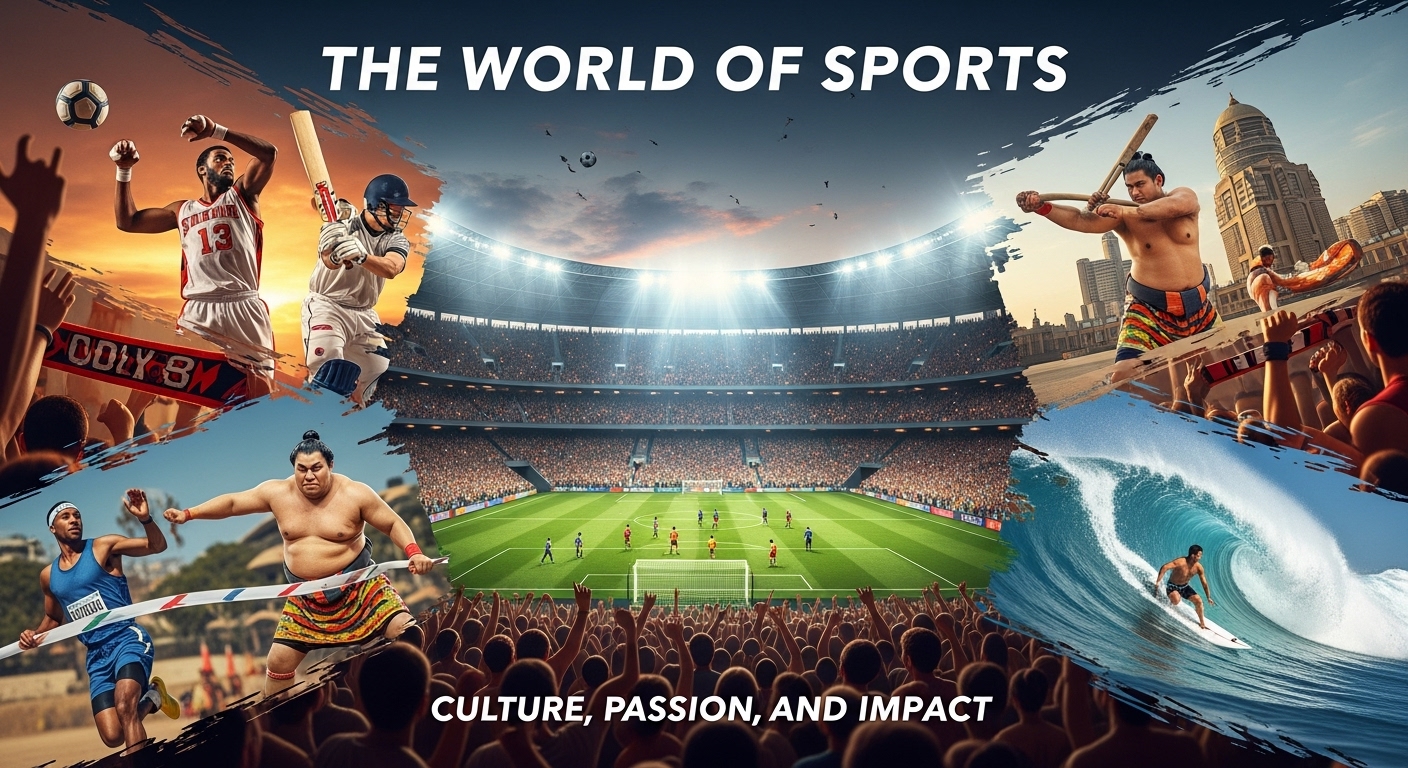Sports have been an integral part of human civilization for thousands of years. From ancient Olympic games in Greece to modern global events like the FIFA World Cup and the Olympics, sports have evolved dramatically but continue to hold a special place in human society. They are not merely games or physical exercises; they embody cultural values, promote social interaction, and contribute significantly to personal and societal development. In this blog post, we will explore the multifaceted world of sports, examining its types, benefits, impact on society, and the modern trends shaping its future.
Understanding Sports
At its core, sports can be defined as physical activities that involve skill, competition, and rules. While the majority of people associate sports with physical prowess, mental acuity and strategy play equally crucial roles in many games. Sports are broadly classified into several categories based on the nature of activity and competition:
Types of Sports
- Team Sports
Team sports require coordination, cooperation, and strategic planning among players. Popular examples include football, basketball, cricket, and hockey. Team sports teach important life skills such as teamwork, leadership, communication, and problem-solving. - Individual Sports
Individual sports focus on personal performance and discipline. Examples include tennis, swimming, athletics, boxing, and gymnastics. These sports emphasize self-reliance, personal goal-setting, and resilience. - Adventure and Outdoor Sports
These sports combine physical exertion with an element of adventure. Activities such as rock climbing, skiing, trekking, and surfing fall into this category. They challenge both physical endurance and mental courage. - Combat Sports
Combat or martial arts sports involve direct competition between participants, often requiring strength, agility, and tactical thinking. Examples include judo, wrestling, karate, and taekwondo. - Mind Sports
Not all sports are physical; some require intense mental skill and strategy. Chess, e-sports, and bridge are categorized as mind sports, highlighting the cognitive aspect of competitive activities.
The Importance of Sports
Sports play a significant role in physical, mental, and social development. Their impact goes far beyond the playing field and can influence various aspects of life.
Physical Health Benefits
Participating in sports promotes overall physical health by improving cardiovascular endurance, muscular strength, flexibility, and coordination. Regular engagement reduces the risk of chronic illnesses such as obesity, diabetes, and heart disease. For children and adolescents, sports encourage proper growth and development, while adults benefit from sustained fitness and longevity.
Mental Health Benefits
Sports are also crucial for mental well-being. Physical activity stimulates the release of endorphins, the body’s natural mood enhancers, reducing stress and anxiety. Participation in competitive or recreational sports fosters discipline, focus, and self-esteem. For many individuals, sports act as a productive outlet to cope with challenges, manage emotions, and maintain mental clarity.
Social Benefits
Sports serve as a social glue, bringing people together across cultures, genders, and age groups. Whether participating in local leagues, watching professional matches, or engaging in casual games, sports encourage camaraderie, teamwork, and mutual respect. They can break down social barriers, promote inclusivity, and foster a sense of belonging within communities.
Educational Benefits
Sports can enhance educational experiences by developing skills such as leadership, time management, and critical thinking. Many academic institutions integrate sports into their curricula to cultivate holistic development in students. Athletes often learn resilience, perseverance, and problem-solving, which are transferable skills beneficial in academic and professional life.
Sports in History
The history of sports is rich and diverse, reflecting human evolution and societal changes. Ancient civilizations engaged in sports not only for entertainment but also for military training and religious purposes.
Ancient Civilizations
- Greece: The ancient Olympic Games, held in Olympia, were a major event celebrating physical excellence and unity among city-states. Disciplines included running, wrestling, discus, and javelin.
- China: Martial arts, archery, and chariot racing were prominent, often linked to military preparedness and philosophical teachings.
- Egypt: Sports like swimming, hunting, and fishing were practiced, reflecting daily life and leisure activities of the elite.
Modern Era
The modern era saw sports transition into organized competitions, with standardized rules, governing bodies, and global events. Football, cricket, basketball, and tennis became popular worldwide. The International Olympic Committee (IOC), established in 1894, played a pivotal role in reviving the Olympic Games and promoting international sportsmanship.
Iconic Sports Events
Global sports events have become cultural phenomena, inspiring millions and uniting diverse populations. Some of the most iconic events include:
- Olympic Games: A celebration of athletic prowess across multiple disciplines, held every four years.
- FIFA World Cup: The pinnacle of football, attracting massive global audiences.
- Super Bowl: A cultural spectacle in the United States, combining sport, entertainment, and commercial appeal.
- Wimbledon: The oldest tennis tournament, known for tradition, prestige, and elite competition.
These events transcend mere athletic performance, influencing fashion, media, tourism, and national pride.
The Role of Technology in Sports
Technology has transformed how sports are played, analyzed, and consumed. Innovations enhance performance, improve safety, and elevate fan engagement.
- Performance Tracking: Wearables, sensors, and AI analytics help athletes monitor physical metrics and optimize training.
- Video Assistance: Video Assistant Referee (VAR) in football and Hawk-Eye technology in tennis ensure fair play and accurate decision-making.
- Virtual and Augmented Reality: These technologies offer immersive experiences for fans and aid in athlete training.
- E-sports: Digital gaming competitions are now considered legitimate sports, with professional leagues and global audiences.
Sports and Society
Sports reflect societal values and influence cultural norms. They can serve as a platform for advocacy, social change, and diplomacy.
Promoting Inclusivity
Sports encourage participation regardless of gender, age, or ability. Initiatives such as the Paralympics and Special Olympics highlight the potential of differently-abled athletes, challenging stereotypes and fostering inclusivity.
National Identity
Success in international sports often fosters national pride. Iconic athletes and teams become symbols of achievement and unity, inspiring future generations to pursue excellence.
Economic Impact
Sports significantly contribute to the economy through ticket sales, merchandise, sponsorships, media rights, and tourism. Hosting global events stimulates infrastructure development and creates employment opportunities.
Challenges in Sports
Despite its many benefits, the world of sports faces challenges that must be addressed to maintain integrity, fairness, and accessibility.
- Doping and Cheating: The misuse of performance-enhancing substances undermines fair competition and athlete health.
- Corruption: Governance issues and financial mismanagement can affect sports organizations and events.
- Inequality: Disparities in funding, access, and recognition persist, especially for women and marginalized groups.
- Injuries: Physical demands can result in short- and long-term injuries, affecting athletes’ careers and quality of life.
Addressing these challenges requires coordinated efforts from governing bodies, athletes, coaches, and fans.
Future Trends in Sports
The future of sports is poised for exciting transformations, driven by innovation, globalization, and changing societal values.
- Sustainable Sports: Environmental considerations are becoming central in organizing events, designing equipment, and maintaining facilities.
- Digital Engagement: Online platforms, virtual competitions, and streaming services expand access to fans worldwide.
- Personalized Training: AI-driven analytics and wearable technology will enable individualized coaching for peak performance.
- Inclusive Sports: Continued efforts toward gender equality, accessibility, and diversity will redefine sports culture globally.
Conclusion
Sports are far more than just games; they are a reflection of human ambition, creativity, and resilience. They foster physical fitness, mental well-being, social cohesion, and cultural identity. Through centuries, sports have evolved in form, reach, and significance, shaping societies and inspiring individuals. In the modern world, technology, inclusivity, and global connectivity are redefining sports, ensuring they remain a central aspect of human life.
Whether you are an athlete, a fan, or someone exploring the cultural impact of sports, one thing is clear: sports have a unique ability to connect people, transcend boundaries, and celebrate the human spirit. As we look to the future, the enduring value of sports lies not just in competition but in their power to inspire, unite, and transform lives across the globe.



